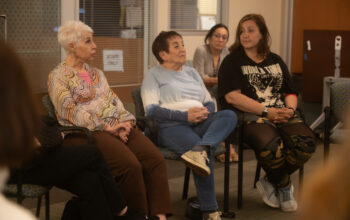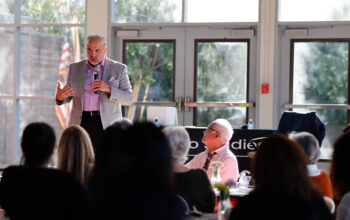The Film Club continues the tradition by hosting its Film Series for the fourth consecutive semester.
All students and faculty members are encouraged to come out to the premiere of the Film Club’s Fall Semester Film Series on Oct. 23 in the Pierce College Great Hall from 1-4 p.m. Film buffs and journalism enthusiasts are welcome to join the festivities, and participate in the panel discussions.
This semester’s theme is “Journalism: Ethics or Profit?” The Film Series will be screening three major motion films, and will have panel discussions following each film in the series.
The panelists for the screening of “All the President’s Men” are Film Club Advisor Ken Windrum, instructor of philosophy Cara Gillis, journalism instructor Richard Favela, ASO Club Rep. for Film Club George Brooks and Film Club Social Media Manager Mareo-Ahmir Lawson.
Film Series day one: Monday, Oct. 23, from 1-4 p.m. in the Great Hall (“All the President’s Men”).
Film Series day two: Wednesday, Nov. 9, from 7-10 p.m. in the Great Hall (“Nightcrawler”).
Film Series day three: Thursday, Nov. 30, 2-5 p.m. in the Great Hall (“Spotlight”).
Windrum said “All the President’s Men” is the perfect opener to the series.
“In many ways, ‘All the President’s Men’ is an obvious choice, because it’s maybe the most famous example of good journalism in the twentieth century,” Windrum said. “It’s a famous movie, and it’s a very entertaining movie. It is very well made, so it’s a good example to start with if you want to show what good journalistic ethics should be.”
Windrum said movies often shape our perspective.
“There have been a lot of movies about journalists, and when you make a movie about journalists, sometimes the movie itself has a specific position or specific attitude on what they think journalistic ethics should be, by making a point or statement,” Windrum said.
Windrum said he hopes students will have questions after watching the movie.
“What does it actually show us of the world? How does it present actual people practicing journalism ethics or failing journalism ethics?” Windrum said.
Windrum hopes that students join the dialogue.
“What I always expect for any of these events is that students will enjoy themselves, and they will have a good conversation afterward that will get them thinking,” Windrum said. “The best part of event to me is not so much the film, but the conversation. That’s why we have panels.”
Brooks said he wants the campus to come together to enjoy the film.
“We want to share that love and the joy that watching film gives us with other students on campus. I think the Film Series is good at doing that,” Brooks said.
Brooks said he hopes to inform those that attend the event.
“Movies can be great for escaping reality, but sometimes they can also be great touchstones for popular culture and what’s going on in reality. Part of the purpose of the film series is to expose people to movies they otherwise might not have watched,” Brooks said.
Lawson said analyzing the film is the most important part of the series.
“The objective of the film series is to give people on campus an opportunity to see a film, and hear a deeper, analytical perspective from people who are passionate about film,” Lawson said.
Lawson said the panel discussion may have opposing views.
“Some people are going to agree and others will disagree. But we are all going to enjoy the experience,” Lawson said.
Windrum said profit sometimes dictates ethics.
“Part of the series is to show how ethics are often compromised by profit,” Windrum said. “All journalists are hopefully telling the truth, but what if telling the truth is expensive?”
Windrum said that bigger organizations have to be more careful, because repercussions can involve money. Whereas, others can lie on the internet without consequences.
“I do think there is something to be said for being a big organization like CBS or The New York Times in that you have a lot to lose. And if you are lying you could lose a lot of money,” Windrum said. “If you go on the internet and start spouting stuff, you can say it’s your opinion or whatever, and you could get away with a lot.”
Windrum said he believes major newspapers and major news sources are legitimate, but he questions the validity of news circulating on the Internet.
“Obviously, the ethics are different when you get online. I mean this has been an amazingly good thing, and an amazingly bad thing. It allows a lot of people a voice who never had them, but also allows people to say things without any proof,” Windrum said.
Windrum said some people in this country believe in crazy things.
“A lot of people are just poorly informed. And in some ways, it was almost better when you just had three networks, because at least you didn’t get out and out lunacy,” Windrum said. “It may have been more homogenizing, and may have excluded voices. But today you get stuff that used to be laughed at being peddled on the internet.”
Lawson said it is crucial to have journalistic ethics on social media.
“I think it’s important for all of us to understand, because we are all in a new media age now. Social media is like a new form of journalism, and its intertwining with film and television becoming a new form of broadcasting,” Lawson said.



